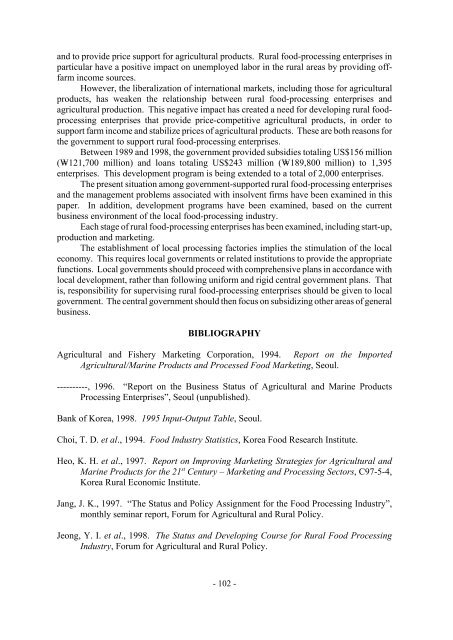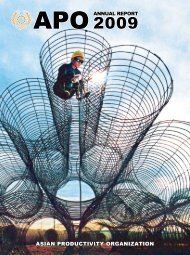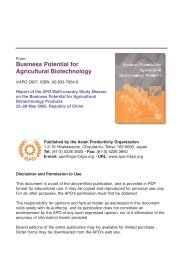Development of Agribusiness Enterprises - Asian Productivity ...
Development of Agribusiness Enterprises - Asian Productivity ...
Development of Agribusiness Enterprises - Asian Productivity ...
You also want an ePaper? Increase the reach of your titles
YUMPU automatically turns print PDFs into web optimized ePapers that Google loves.
and to provide price support for agricultural products. Rural food-processing enterprises in<br />
particular have a positive impact on unemployed labor in the rural areas by providing <strong>of</strong>ffarm<br />
income sources.<br />
However, the liberalization <strong>of</strong> international markets, including those for agricultural<br />
products, has weaken the relationship between rural food-processing enterprises and<br />
agricultural production. This negative impact has created a need for developing rural foodprocessing<br />
enterprises that provide price-competitive agricultural products, in order to<br />
support farm income and stabilize prices <strong>of</strong> agricultural products. These are both reasons for<br />
the government to support rural food-processing enterprises.<br />
Between 1989 and 1998, the government provided subsidies totaling US$156 million<br />
(W= 121,700 million) and loans totaling US$243 million (W= 189,800 million) to 1,395<br />
enterprises. This development program is being extended to a total <strong>of</strong> 2,000 enterprises.<br />
The present situation among government-supported rural food-processing enterprises<br />
and the management problems associated with insolvent firms have been examined in this<br />
paper. In addition, development programs have been examined, based on the current<br />
business environment <strong>of</strong> the local food-processing industry.<br />
Each stage <strong>of</strong> rural food-processing enterprises has been examined, including start-up,<br />
production and marketing.<br />
The establishment <strong>of</strong> local processing factories implies the stimulation <strong>of</strong> the local<br />
economy. This requires local governments or related institutions to provide the appropriate<br />
functions. Local governments should proceed with comprehensive plans in accordance with<br />
local development, rather than following uniform and rigid central government plans. That<br />
is, responsibility for supervising rural food-processing enterprises should be given to local<br />
government. The central government should then focus on subsidizing other areas <strong>of</strong> general<br />
business.<br />
BIBLIOGRAPHY<br />
Agricultural and Fishery Marketing Corporation, 1994. Report on the Imported<br />
Agricultural/Marine Products and Processed Food Marketing, Seoul.<br />
----------, 1996. “Report on the Business Status <strong>of</strong> Agricultural and Marine Products<br />
Processing <strong>Enterprises</strong>”, Seoul (unpublished).<br />
Bank <strong>of</strong> Korea, 1998. 1995 Input-Output Table, Seoul.<br />
Choi, T. D. et al., 1994. Food Industry Statistics, Korea Food Research Institute.<br />
Heo, K. H. et al., 1997. Report on Improving Marketing Strategies for Agricultural and<br />
Marine Products for the 21 st Century – Marketing and Processing Sectors, C97-5-4,<br />
Korea Rural Economic Institute.<br />
Jang, J. K., 1997. “The Status and Policy Assignment for the Food Processing Industry”,<br />
monthly seminar report, Forum for Agricultural and Rural Policy.<br />
Jeong, Y. I. et al., 1998. The Status and Developing Course for Rural Food Processing<br />
Industry, Forum for Agricultural and Rural Policy.<br />
- 102 -
















